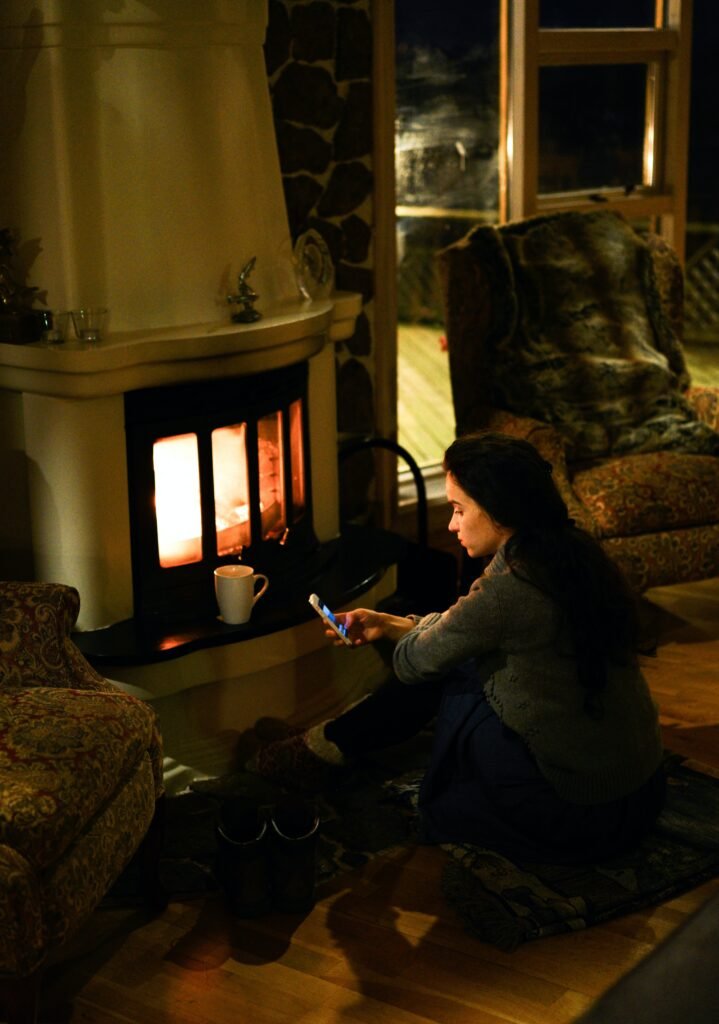Imagine the cozy winter evenings spent in front of a crackling fireplace, enveloped in warmth and comfort. But have you ever wondered about the different types of fireplace heaters available and which one is more efficient? In this article, we will compare the efficiency of electric and gas fireplace heaters, unraveling their technological secrets and helping you make an informed decision when it comes to bringing the perfect ambiance to your home. So sit back, relax, and let’s delve into the world of fireplace heater technology.
Efficiency Factors
Energy Source
When comparing electric and gas fireplace heaters, the energy source is a crucial factor to consider. Electric fireplace heaters draw power from the electrical grid, while gas fireplace heaters utilize natural gas or propane. The availability and cost of these energy sources can vary depending on your location.
Heat Output
Heat output is another essential efficiency factor to evaluate. Electric fireplace heaters typically produce radiant heat, which warms up the surrounding air quickly. On the other hand, gas fireplace heaters generate both radiant and convective heat, creating a more substantial heat output. This means that gas heaters can quickly warm up larger spaces and maintain a cozy temperature throughout the room.
Control and Regulation
Both electric and gas fireplace heaters offer various control and regulation options. Electric models usually come with thermostats and remote controls, allowing you to set and maintain precise temperature levels. Gas fireplace heaters, on the other hand, often provide manual control knobs or programmable options for adjusting the flame height and heat output.
Conversion Efficiency
Conversion efficiency refers to how well an appliance converts fuel or electricity into usable heat. Electric fireplace heaters tend to have higher conversion efficiency as they directly convert all the electrical energy into heat. In contrast, gas fireplace heaters may experience some energy loss during the combustion process, resulting in slightly lower conversion efficiency overall.
Environmental Impact
When it comes to the environmental impact, electric fireplace heaters have an advantage over gas models. Electric heaters produce zero direct emissions, except for the indirect emissions associated with electricity generation. On the other hand, gas fireplace heaters emit combustion byproducts, including carbon monoxide (CO) and nitrogen dioxide (NO2). However, modern gas heaters are equipped with vents and safety mechanisms to minimize these emissions.
Cost Comparison
Initial Cost
The initial cost of purchasing and installing a fireplace heater can vary significantly between electric and gas models. Electric fireplace heaters tend to be less expensive upfront since they don’t require any additional installation or venting. On the other hand, gas fireplace heaters often require professional installation, which can involve running gas lines and venting systems. As a result, the initial cost of gas fireplace heaters is usually higher.
Operating Cost
When considering the operating cost of fireplace heaters, electricity rates and gas prices are crucial factors. Electric fireplace heaters typically consume more electricity than other appliances, resulting in higher energy bills. Gas fireplace heaters, although they require a source of natural gas or propane, generally have lower operating costs. However, regional gas prices can significantly impact the overall operating cost, so it’s essential to consider these factors before making a decision.

This image is property of images.pexels.com.
Installation and Maintenance
Installation Process
The installation process differs significantly between electric and gas fireplace heaters. Electric models are relatively easy to install and require minimal setup. They can be simply plugged into a standard electrical outlet, making them suitable for both homeowners and renters. Gas fireplace heaters, on the other hand, require professional installation to ensure proper gas line connection and venting installation. This process may involve making modifications to your home’s existing infrastructure.
Ventilation Requirements
Ventilation requirements vary depending on the type of fireplace heater. Electric models do not require any venting as they do not emit any harmful gases. They can be installed in any room without the need for additional ventilation measures. Gas fireplace heaters, however, necessitate proper ventilation to ensure the safe removal of combustion byproducts. This may involve installing a vent pipe or flue system to direct exhaust gases outside.
Safety Concerns
When it comes to safety concerns, both electric and gas fireplace heaters have their considerations. Electric models generally pose a lower risk of accidents, as they do not involve open flames or combustible fuels. Gas fireplace heaters, while safe when installed and maintained correctly, carry a higher risk of gas leaks, carbon monoxide emissions, and fire hazards. Regular inspections and adherence to safety guidelines are crucial for ensuring the safe operation of gas fireplace heaters.
Maintenance Needs
In terms of maintenance, electric fireplace heaters are relatively low maintenance. They do not require regular cleaning or fuel refilling, making them hassle-free. On the other hand, gas fireplace heaters may require periodic cleaning of combustion chambers and venting systems to ensure optimal performance and safety. Gas models may also require regular inspection of gas lines and components to prevent leaks and other potential issues.
Heating Performance
Fast Warm-Up Time
Electric fireplace heaters are known for their fast warm-up time. They can quickly generate heat as soon as they are turned on, providing instant warmth to the room. Gas fireplace heaters, while not as fast as electric models, also provide decent warm-up times. The efficiency and BTU output of gas heaters contribute to their ability to warm up the room relatively quickly.
Consistent Heat Distribution
To maintain a comfortable temperature throughout the room, consistent heat distribution is crucial. Electric fireplace heaters generally excel in this aspect, as they radiate heat evenly in all directions. Gas fireplace heaters, with their convective heat capabilities, can also distribute heat consistently, ensuring that every corner of the room receives warmth.
Heating Capacity
The heating capacity of fireplace heaters is determined by the BTU (British Thermal Unit) rating. Electric fireplace heaters typically have lower BTU ratings compared to gas models. This means that electric heaters are more suitable for smaller spaces or supplemental heating. Gas fireplace heaters, with their higher BTU ratings, can effectively heat larger areas and serve as the primary heat source for the room.

This image is property of images.pexels.com.
Aesthetics and Noise Level
Flame Realism
Flame realism is an important factor for those seeking the ambiance of a traditional fireplace. Electric fireplace heaters often feature realistic flame effects, complete with glowing embers and realistic log sets. Some models even offer adjustable flame brightness and color options for a customized experience. Gas fireplace heaters, with their real flames fueled by natural gas or propane, offer an authentic and visually appealing fireplace ambiance.
Decorative Options
Both electric and gas fireplace heaters offer various decorative options to cater to different aesthetic preferences. Electric models usually feature different flame colors, ember bed options, and customizable finishes to match your desired interior style. Gas fireplace heaters, with their authentic flames, also offer a range of design options, including different log sets, decorative glass media, and mantel choices to enhance the overall appearance of your fireplace.
Noise Level
While it may not be a significant concern for some, noise level can be a factor to consider, especially for those seeking a quiet and serene ambiance. Electric fireplace heaters operate silently, producing no noise except for the occasional sound of the fan. Gas fireplace heaters, due to the combustion process and gas flow, may produce a gentle hissing or crackling sound. However, the noise level of gas models is generally minimal and adds to the authenticity of the fireplace experience.
Flexibility and Convenience
Portability
Electric fireplace heaters offer the advantage of portability. They are generally lightweight and can be easily moved from one room to another without any hassle. Gas fireplace heaters, on the other hand, are fixed installations and require professional disconnection and reinstallation if you plan to relocate them. Therefore, if portability is a priority, electric fireplace heaters are the more suitable option.
No Fuel Requirement
One of the significant benefits of electric fireplace heaters is that they do not require any fuel. You don’t need to worry about storing, refilling, or running out of fuel, making them highly convenient. Gas fireplace heaters, however, rely on a steady supply of natural gas or propane, which might require additional maintenance and monitoring.
Ease of Use
When it comes to ease of use, both electric and gas fireplace heaters have their advantages. Electric models typically feature user-friendly controls, such as thermostats and remote controls, allowing you to easily adjust temperature settings. Gas fireplace heaters may require a little more manual control, but modern models often come with electronic ignition systems and programmable options for added convenience.

This image is property of images.pexels.com.
Safety Considerations
Risk of Gas Leaks
With gas fireplace heaters, there is a potential risk of gas leaks. It’s crucial to ensure proper installation and regular maintenance to minimize the chances of gas leakage. Professional installation, periodic inspections, and regular checks for gas leaks are essential safety measures to protect against this risk.
Carbon Monoxide Emission
One of the primary safety concerns associated with gas fireplace heaters is carbon monoxide (CO) emission. To prevent CO buildup, it is imperative to have proper ventilation in place and install carbon monoxide detectors in the vicinity of the heater. Regular maintenance, including inspections and cleaning of venting systems, is vital to ensure the safe operation of gas fireplace heaters.
Fire Safety
Fire safety is a concern for both electric and gas fireplace heaters, albeit in different ways. Electric models eliminate the risk of an open flame, reducing the chance of accidental fires. However, it’s essential to keep flammable objects away from the heater and practice basic fire safety precautions. Gas fireplace heaters, with their real flames, carry a higher fire risk. Following manufacturer guidelines, using a protective screen, and keeping flammable materials a safe distance away are crucial safety practices to prevent fire accidents.
Environmental Impact
Emissions and Air Quality
Electric fireplace heaters have the advantage of producing zero direct emissions. While they indirectly contribute to emissions through electricity generation, they do not release any pollutants or greenhouse gases on-site. Gas fireplace heaters, on the other hand, emit combustion byproducts such as carbon monoxide and nitrogen dioxide. However, modern gas models are designed with efficient combustion processes and venting systems to minimize these emissions.
Carbon Footprint
When considering the carbon footprint of fireplace heaters, it’s essential to consider both the operational and manufacturing aspects. Electric fireplace heaters rely on electricity, which may come from fossil fuel-based power plants. However, advancements in renewable energy sources can significantly reduce their carbon footprint. Gas fireplace heaters have a carbon footprint associated with the combustion of natural gas or propane. The carbon footprint of gas models can vary depending on the source and production methods of the fuel.
Regulatory Compliance
Building Codes and Regulations
To ensure compliance with building codes and regulations, it’s important to consider the specific requirements for fireplace heaters in your area. Different jurisdictions may have specific guidelines for installation, venting, and safety measures. Consult local building authorities or professionals to ensure proper compliance before purchasing and installing a fireplace heater.
Permit Requirements
In some areas, obtaining permits may be a requirement for installing fireplace heaters. Gas fireplace heaters, in particular, may often require permits due to the involvement of gas lines and venting systems. It’s essential to check with local authorities or consult professionals to determine whether permits are necessary and to adhere to the required procedures.
Suitable Applications
Residential Use
Both electric and gas fireplace heaters are suitable for residential use. Electric models are often preferred for smaller spaces, such as apartments or smaller rooms, due to their portability and ease of installation. Gas fireplace heaters, with their higher heat output and realistic flames, are often chosen as the primary heat source in larger living spaces or homes.
Commercial Use
Commercial spaces can also benefit from both electric and gas fireplace heaters. Electric models offer ease of installation and control options, making them a convenient choice for offices, waiting areas, or restaurants. Gas fireplace heaters, with their larger heating capacities and realistic flames, can create a cozy and inviting ambiance in larger commercial spaces such as hotels, restaurants, or lobbies.
Outdoor Use
For outdoor heating needs, gas fireplace heaters are generally the preferred choice. They can withstand outdoor conditions and provide reliable heat for outdoor patios, decks, or gazebos. Electric models, while also suitable for outdoor use, may require specific weatherproofing or protective measures due to their electrical components.
In conclusion, when comparing electric and gas fireplace heaters, various factors come into play. Considerations such as energy source, heat output, control options, and environmental impact are crucial when making an informed decision. Cost, installation, maintenance requirements, and safety considerations should also be taken into account. Ultimately, the most suitable choice depends on your specific needs, preferences, and the available infrastructure in your home or commercial space.




